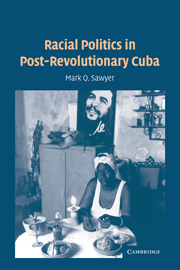Book contents
- Frontmatter
- Contents
- List of Figures and Tables
- Acknowledgments
- Introduction
- 1 Race Cycles, Racial Hierarchy, and Inclusionary Discrimination: A Dynamic Approach
- 2 Freedom and Discrimination: Uneven Inequality and Inclusion in Pre-Revolutionary Cuba
- 3 Race and Revolution: Transformation and Continuity
- 4 Match Made in Heaven or Strange Bedfellows? Black Radicals in Castro's Cuba
- 5 Race and Daily Life in Cuba During the Special Period: Part I: Interview Data
- 6 Race and Daily Life in Cuba During the Special Period: Part Ⅱ: Survey Research
- 7 Racial Politics in Miami: Ninety Miles and a World Away
- Conclusion
- Bibliography
- Index
4 - Match Made in Heaven or Strange Bedfellows? Black Radicals in Castro's Cuba
Published online by Cambridge University Press: 05 September 2012
- Frontmatter
- Contents
- List of Figures and Tables
- Acknowledgments
- Introduction
- 1 Race Cycles, Racial Hierarchy, and Inclusionary Discrimination: A Dynamic Approach
- 2 Freedom and Discrimination: Uneven Inequality and Inclusion in Pre-Revolutionary Cuba
- 3 Race and Revolution: Transformation and Continuity
- 4 Match Made in Heaven or Strange Bedfellows? Black Radicals in Castro's Cuba
- 5 Race and Daily Life in Cuba During the Special Period: Part I: Interview Data
- 6 Race and Daily Life in Cuba During the Special Period: Part Ⅱ: Survey Research
- 7 Racial Politics in Miami: Ninety Miles and a World Away
- Conclusion
- Bibliography
- Index
Summary
In September 1960, after being snubbed by the staff members of a posh Manhattan hotel while visiting the U.N., Fidel Castro and his entourage made their way to Harlem to stay at the venerable Hotel Theresa. There, Castro was greeted by people shouting, “Fidel, free American Negroes too!” “Fidel, turn Harlem into another Sierra Maestra!” and “Fidel si, Ku Klux Klan no!” (quoted in C. Moore 1991, 80). The crowd's warm reception was matched by the respect and interest with which the Cuban leader was received by a broad spectrum of black leaders. A few days after Nikita Khrushchev visited Castro in Harlem, Malcolm X paid Fidel a call. Later, Castro delivered a now-legendary speech before the U.N. General Assembly in which he stated his friendship and closeness with black America. He proclaimed: “Before coming to the United States we already enjoyed great sympathy, but now it has increased even more. American Negroes have grasped one great human truth: that everyone is happy in Cuba” (82).
While the mainstream media in the United States was suspicious and condemnatory of the Cuban Revolution, the U.S. black media followed the revolution closely and generally supported it (Gosse 1998). To blacks in the United States, the revolution appeared to have created a far more fluid system of race and class than the system that existed in the United States, or, for that matter, anywhere in Latin America.
- Type
- Chapter
- Information
- Racial Politics in Post-Revolutionary Cuba , pp. 79 - 101Publisher: Cambridge University PressPrint publication year: 2005



